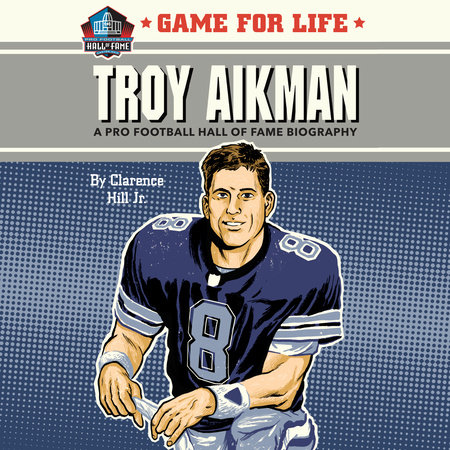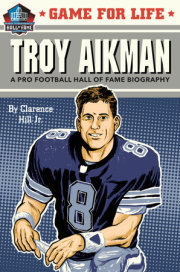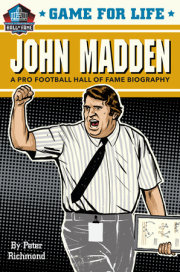If you could dream up the perfect quarterback, he would look like Troy Aikman.
A six-foot-four, 220-pound, perfectly designed prototype with Hollywood good looks. Picture a clean-shaven Chris Hemsworth, who plays Thor in the Avengers series.
Aikman enjoyed a storybook career that lived up to every expectation imaginable. After an All-American career in college at UCLA, he was picked number one overall in the 1989 NFL Draft by the most popular team in pro sports, the Dallas Cowboys.
He took them from the depths of despair to being the dominant team of the 1990s, with three Super Bowl titles in four years. He ended his career celebrated as an all-time great with his induction into the Pro Football Hall of Fame.
From the outside looking in, Troy seemingly had it made from birth. He was the natural. He was destined for greatness and ultimately achieved it.
But the truth is not as pretty and clean as the picture.
It began with a California kid growing up dreaming of playing baseball in the major leagues. Then, at age twelve, he moved with his family to rural Oklahoma—specifically, to the small town of Henryetta, with a sprawling population of roughly six thousand.
Once there, Troy was quickly introduced to life on the farm. He was raised on hard work, responsibility, and discipline by a father—the Babe Ruth of welders—who had no time for fun and games.
“That was a lifestyle that was foreign to me,” Troy later said about moving to the farm. “It helped teach me to embrace the difficult times. No one, I don’t care who it is, ever goes through life and [does] not have some setbacks.”
Those teachings would serve Aikman well in his roundabout route to stardom.
Football was not the first choice or childhood dream of Troy Kenneth Aikman, the youngest of three kids and the only boy born to Kenneth and Charlyn in West Covina, California.
The family soon settled in Cerritos, a suburb of Los Angeles, and Troy grew up a typical California kid. He loved to ride his bike everywhere he went and took a liking to all sports—but mainly baseball. He inherited this passion for the sport from his mother and her side of the family.
Charlyn didn’t just watch baseball games. She had a scorebook and kept score while her favorite team, the California Angels, played.
“When he was little, I used to watch sports on television, but his dad wasn’t into it,” Charlyn said. “And, yes, I used to make my own scorebook. I started that as a kid. Baseball was my favorite.”
Her brothers were big-time baseball players. One played in college and then joined a famous traveling four-player softball team called the King and His Court. Troy’s uncles’ experience helped build the foundation for his affinity for the sport.
That’s what he and his friends played and loved for the first twelve years of his life.
He concedes now that if he had stayed on the West Coast, he probably would have ended up playing professional baseball.
But that was before Aikman’s dad decided to go against what seemed to be the American trend of chasing happiness from the East to the West. He migrated from the West Coast to the Midwest, rather than the other way around.
Kenneth, a construction foreman and a welder, had grown up in Iowa and wanted to get out of the rat race, the traffic, and the congestion in California. He longed to get back to country living. So Kenneth bought 172 acres of farmland in tiny Henryetta, Oklahoma, 1,419 miles from Cerritos. “He had a friend in California, and Henryetta was his hometown,” Charlyn said. “We went there on vacation one summer, and he really liked it.”
The farm was also seven miles from the nearest town. So for Troy Aikman, it was a culture shock in every sense.
“He thought he had just watched The Beverly Hillbillies [a sitcom in the 1960–70s about a rural family who moved to Beverly Hills after striking it big in oil],” Troy’s childhood friend Daren Lesley recalled. “He was shell-shocked, going from a solid concrete jungle to a dirt road, from not seeing many farm animals to owning them. I don’t know what his chores were when he was a kid in Cerritos. But the yard got a whole lot bigger, and he had a lot of chores to tend to on the farm.”
Kenneth didn’t have much time for sports, and his son learned at a young age that he would have to grow up tough or he wasn’t going to make it.
Kenneth built the Aikmans’ house himself, with two other carpenters and his son.
They had animals—cows, horses, pigs, and chickens—that had to be fed before Troy went to school. Mountainous bales of hay had to be hauled.
“I say ‘we hauled hay,’ ” Aikman recalled. “We cut our own hay. I hauled hay. There were nights or days where I would be hauling hay all day long, and then I’d leave to go to an American Legion baseball game or something. . . . I’d go play in the game, doubleheader, and I’d get back. And it was supposed to rain, and my dad’s still out in the fields getting the hay picked up. I’m back out there till five or six in the morning, making sure all the hay is in.”
Kenneth was not the sympathetic or soft sort. He once cut off the tip of his finger while working but never stopped or took a break to tend to it. He was tough, and he raised his son to be tough through hard work.
There was no getting away from it.
In one of his few interviews, Kenneth told the Fort Worth Star-Telegram he never showed Troy much affection.
And Troy certainly noticed. But he also appreciated the tough love.
Troy says his father demanded a lot, and there were certainly consequences for poor decisions. But this experience likely set the foundation for the discipline and responsibility and toughness that would serve him well as quarterback of America’s team.
“At a young age, it was ‘do what you were told to do,’ and if he needed help doing something, he expected you to do it,” Aikman recalled.
Copyright © 2019 by Clarence Hill, Jr.. All rights reserved. No part of this excerpt may be reproduced or reprinted without permission in writing from the publisher.












